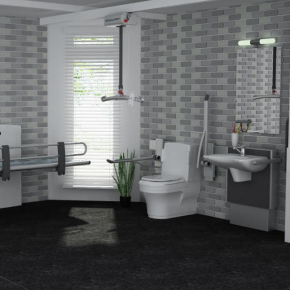
Building on new ‘Best Practice’ guidelines with Closomat
New ‘best practice’ guidelines have been published addressing bedroom and bathroom accessibility in multi-occupancy buildings, be it new build or refurbishment, and Closomat is getting engaged.
It is announcing new developments to enable hotel, residential and care home operators and communal/supported housing providers to comply with these guidelines, in a stylish way, with a unique package from specification, right through fitting to future service & maintenance.
BS8300:2018 – Design of an accessible and inclusive built environment – extends the remit of compliance covered under its predecessor BS8300:2009.
The newest version is not just specific to new build projects, applying to all building types that require permanent sleeping accommodation for disabled people.
It also notes the fact that some disabilities are not visible, such as those with bladder or bowel continence problems, who require urgent access to sanitary facilities.
Under the new guidelines
- up to 5% of bedrooms should have a wheelchair accessible en-suite shower room, if en-suite facilities are available elsewhere in the building
- a further 1% should have a fixed track hoist system
- a further 5% maximum should have an en-suite for ambulant disabled people
- an overall total of 15% of bedrooms large enough to enable easy adaptation should do so if required in the future.
Closomat offers a range of contemporary ceiling track hoist systems that can be tailored to individual needs, enabling movement and transfer within a room, through to an en-suite, or beyond.
In the bathroom, it offers a range of fixtures, such as grab rails, height-adjustable or fixed washbasins that integrate with a stylish wall track system, allowing doe quick and easy adaptation to individual occupant needs.
Its range of wash & dry toilets take accessibility into higher realms of inclusion and intimate hygiene, with contemporary styled floor-standing, wall-mounted and height adjustable variants.
Robin Tuffley, Closomat marketing manager, commented: “Whether designing a new build or refurbishing, it makes sense to future-proof it to accommodate the growing numbers of people with impairments who need help who will stay somewhere, whether short, medium or long term.
“Just in the hotel industry, parties which include a disabled person spend £14billion a year on tourism and travel: can you afford to ignore that?
“The Standard applies also to residential and care homes for example: we all know how that market is set to increase, and that inevitably the older generation have more issues with mobility.”
Contact:
Closomat
Building 1, Brooklands Place,
Brooklands Road,
Sale,
Cheshire,
M33 6SD,
United Kingdom
Visit Supplier's page
Latest news

28th March 2025
Ideal Heating Commercial announces 10-year warranty on Evomax 2 boiler
Evomax 2, the UK’s number one selling commercial wall-mounted boiler from Ideal Heating Commercial, is now available with a 10-year warranty.
Posted in Articles, Building Industry News, Building Products & Structures, Building Regulations & Accreditations, Building Services, Facility Management & Building Services, Heating Systems, Controls and Management, Heating, Ventilation and Air Conditioning - HVAC, Innovations & New Products, Pipes, Pipes & Fittings, Plumbing, Retrofit & Renovation, Sustainability & Energy Efficiency, Videos
28th March 2025
FLIR Si1-LD Acoustic Imaging Camera for Compressed Air Leak Detection
FLIR, a Teledyne Technologies company, introduces the Si1-LD, an industrial acoustic imaging camera that brings faster and more accurate compressed air leak detection to those operating on a modest condition monitoring budget.
Posted in Acoustics, Noise & Vibration Control, Articles, Building Industry News, Building Products & Structures, Building Services, Facility Management & Building Services, Information Technology, Innovations & New Products, Retrofit & Renovation, Sustainability & Energy Efficiency, Thermal Imaging and Monitors
28th March 2025
LIFTEX 2025 Seminar programme announced
Registration has opened for LIFTEX 2025. Now in its 37th year, LIFTEX 2025 is the UK’s only dedicated exhibition for the lift, escalator and access industry and takes place only once every three years.
Posted in Access Control & Door Entry Systems, Accessibility, Articles, Building Industry Events, Building Industry News, Building Products & Structures, Building Regulations & Accreditations, Building Services, Exhibitions and Conferences, Facility Management & Building Services, Health & Safety, Retrofit & Renovation, Security and Fire Protection, Seminars
28th March 2025
MCRMA welcomes ArcelorMittal UK to membership
A UK division of the global steelmaking business ArcelorMittal has become the latest new member of the MCRMA, the industry association representing the metal building envelope sector.
Posted in Articles, Building Associations & Institutes, Building Industry News, Building Products & Structures, Building Systems, Cladding, Facades, Posts, Restoration & Refurbishment, Retrofit & Renovation, Roofs, Steel and Structural Frames, Walls
 Sign up:
Sign up: